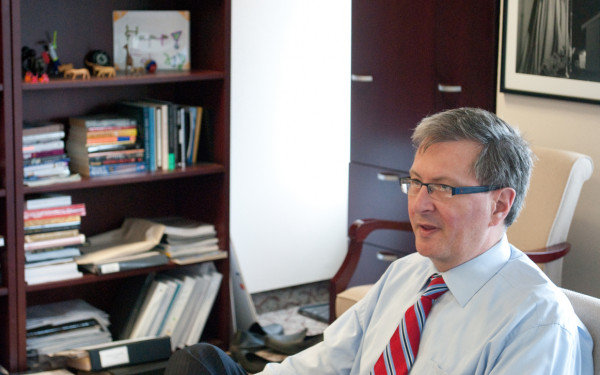Graham Gets Crackin’
Concordia’s Provost Talks Tuition, Academic Plan
Provost David Graham presented Concordia’s new Academic Plan to the Concordia Student Union Council on Wednesday.
_After the presentation, Council voted to reject the plan, citing concerns about its budget, the possibility of a new president tossing it out, a lack of focus on undergraduate needs, a lack of student members on the working group that put the plan together, and some points in the plan being either too vague or too specific.
You can read the article about the meeting on our website, as well as a full transcript of our interview with Dr. Graham._
When Concordia’s Senate meets this Friday, they will vote on a plan that will set the course for the university’s academic development for the next five years.
This will happen against the wishes of its student members, who asked for, and received, a mandate from the CSU council to vote against the plan, a move that has left Provost David Graham, the highest academic officer in the school, less than satisfied.
“Obviously I’m disappointed,” he told The Link. “First of all […] so much of the plan was created with students in mind and thinking of the benefit of students at Concordia that it seems strange to me that students are, for reasons of their own, deciding not to support it.
“I’m disappointed because there’s been such a lengthy consultation process already, and because we did reach out to students last year, including both the CSU and Graduate Students’ Association, without, as far as I can recall, getting any response from them.”
Graham added that after he left the meeting, a number of points were brought up by Council that he would have addressed, including the potential power of the next president to veto the plan.
“I see no reason why the next president would want to change anything in the plan radically,” he said. “The idea that the next president would come in and just veto or jettison the plan seems absurd to me.”
One possible motion Senate will vote on is tabling the plan until January, which will give the working committee that drafted the plan time to refine it further.
But Graham noted that the plan was originally supposed to be voted on last spring, and that he thought the majority of Concordians would be “of the view that the consultation process has really gone on long enough, and it’s time to approve the plan and get it implemented.”
At both Council and the last Senate meeting on Oct. 7, a major sticking point was the plan’s emphasis on attracting better grad students. Students at both bodies asked why the plan focused on how to do that, rather than on better serving the students who are already at Concordia.
Graham said that the point of the plan is not to change the purpose of or restrict access to Concordia. “Nobody is talking about abandoning our traditional commitment to accessibility in the slightest.”
“I think it’s good for all of us if we could attract more good students for all kinds of reasons,” he said. “Not just because they attract good faculty, but because they provide great role models for other students.”He also explained that good graduate students garner positive attention academically, pointing to Rhodes Scholar Lillian Chamas, who was granted the prestigious honor in 2008.
Graham also discussed the controversial $1,625 per year tuition increase that was proposed by the Liberal government in their budget last spring. While he said he understood students’ concerns over the increased fees, he compared the situation in Quebec with other systems around the world.
“When you look at the effects of tuition increases—not sudden violent increases like the ones in England that in my view are completely pernicious—but when you look at the effects [the] increases our government is talking about, those have not produced a decline in enrollment elsewhere,” he said. “Generations of artificially low tuition fees have still left us with one of the lowest university participation rates in Canada.
“Nobody is talking about moving to an American fee model,” he added.
Graham said he felt low tuition actually subsidized richer students, as 35 per cent of the money from tuition increases would go towards raising financial aid.
While that means you shouldn’t expect to see him at the Nov. 10 Day of Action, stay tuned to see how he—and the rest of Senate—respond
to students’ concerns at the Nov. 4 Senate meeting.

webedit_900_600_90.jpg)



_600_375_90_s_c1.jpg)

_600_375_90_s_c1.jpg)